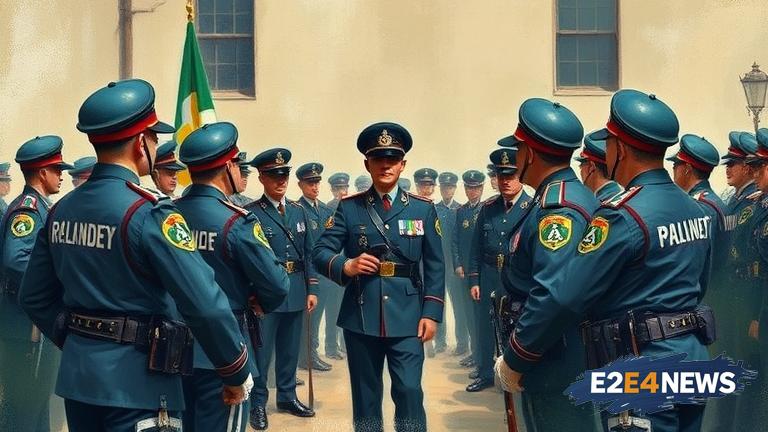On February 9, 1922, a meeting was held in Dublin’s Mansion House, which would ultimately lead to the establishment of the Garda Síochána, Ireland’s national police force. This meeting was a pivotal moment in Irish history, as it brought together key figures who would shape the country’s future. The meeting was attended by prominent Irish politicians, including Michael Collins and Arthur Griffith, who were instrumental in the country’s struggle for independence. The discussions at the meeting focused on the need for a new police force that would replace the Royal Irish Constabulary, which had been disbanded following the Anglo-Irish Treaty. The new force would be responsible for maintaining law and order in the newly independent Irish state. Over the next few months, the details of the new police force were finalized, and on February 22, 1922, the Garda Síochána was officially established. The name ‘Garda Síochána’ is derived from the Irish language, with ‘Garda’ meaning ‘guard’ and ‘Síochána’ meaning ‘peace’. The force was tasked with protecting the citizens of Ireland and upholding the law. Since its establishment, the Garda Síochána has played a vital role in maintaining peace and stability in Ireland. The force has undergone significant changes over the years, with advances in technology and training enabling it to tackle increasingly complex crimes. Despite the challenges it has faced, the Garda Síochána remains a respected and trusted institution in Irish society. The centenary of the meeting that led to the creation of the Garda Síochána is a significant milestone in Irish history, and it is being marked with various events and ceremonies across the country. The anniversary provides an opportunity to reflect on the history and development of the Garda Síochána, as well as its role in shaping modern Ireland. The Garda Síochána has a long and proud tradition of serving the community, and its commitment to justice and equality has earned it a reputation as a world-class police force. As Ireland continues to evolve and grow, the Garda Síochána remains an essential part of the country’s infrastructure, working tirelessly to keep citizens safe and secure. The force’s dedication to protecting the vulnerable and upholding the law has made it a beloved and respected institution in Irish society. The centenary celebrations will include a range of events, including parades, exhibitions, and commemorative ceremonies. These events will provide a unique opportunity for the public to learn more about the history and development of the Garda Síochána, as well as its role in modern Ireland. The Garda Síochána’s centenary is a significant occasion, and it is being marked with the respect and dignity that it deserves. The force’s contribution to Irish society cannot be overstated, and its legacy will continue to shape the country for generations to come. As the Garda Síochána looks to the future, it remains committed to its core values of justice, equality, and community service. The force will continue to evolve and adapt to the changing needs of Irish society, ensuring that it remains a relevant and effective institution in the years to come. The centenary of the meeting that led to the creation of the Garda Síochána is a momentous occasion, and it is being celebrated with pride and enthusiasm across Ireland. The Garda Síochána’s rich history and proud tradition of service have made it an integral part of Irish life, and its legacy will continue to inspire and motivate future generations. The force’s commitment to protecting and serving the community has earned it a special place in the hearts of the Irish people, and its centenary is a celebration of its enduring spirit and dedication. The Garda Síochána’s story is one of courage, sacrifice, and service, and its centenary is a testament to the power of community and the importance of public service. As the Garda Síochána continues to serve and protect the people of Ireland, its legacy will remain an essential part of the country’s history and identity.
